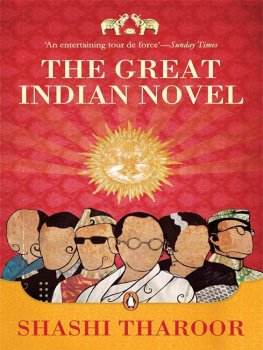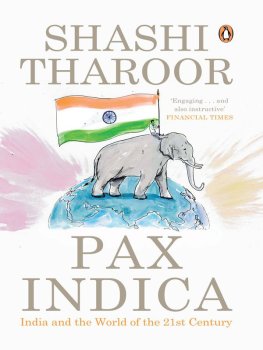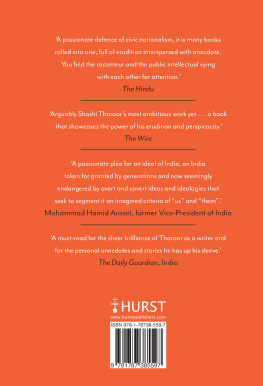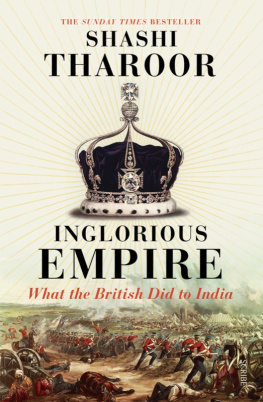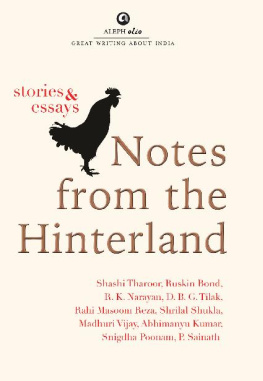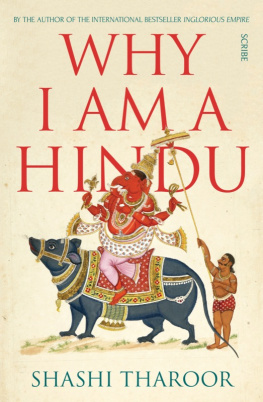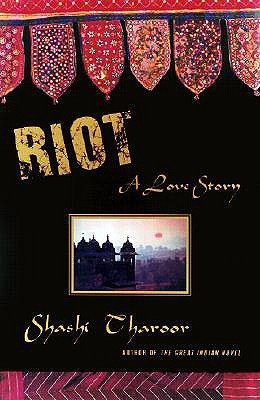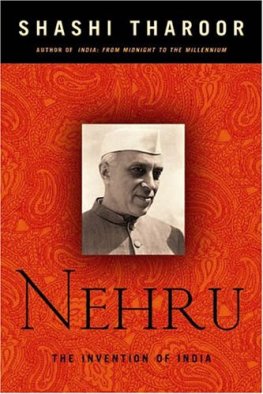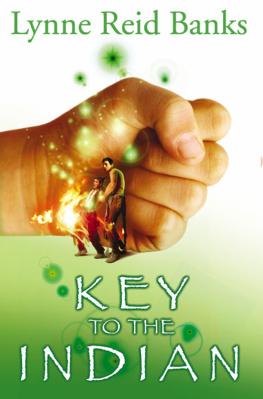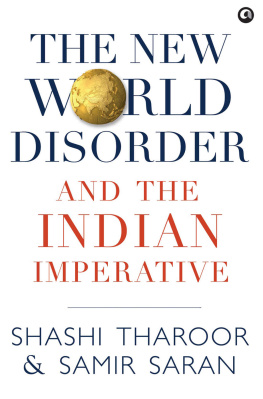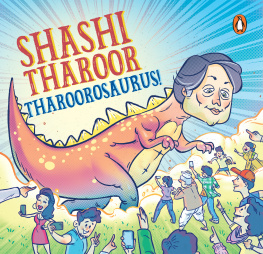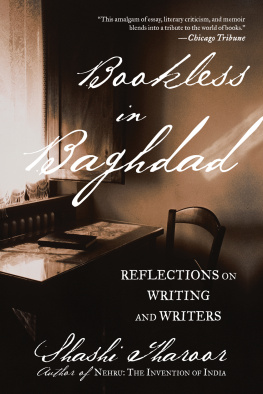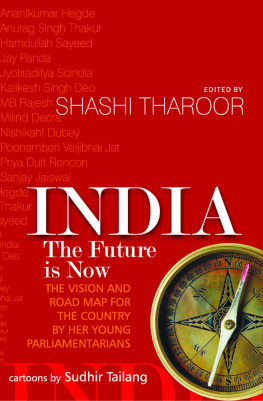Shashi Tharoor - The Great Indian Novel
Here you can read online Shashi Tharoor - The Great Indian Novel full text of the book (entire story) in english for free. Download pdf and epub, get meaning, cover and reviews about this ebook. year: 2009, publisher: Penguin, genre: Prose. Description of the work, (preface) as well as reviews are available. Best literature library LitArk.com created for fans of good reading and offers a wide selection of genres:
Romance novel
Science fiction
Adventure
Detective
Science
History
Home and family
Prose
Art
Politics
Computer
Non-fiction
Religion
Business
Children
Humor
Choose a favorite category and find really read worthwhile books. Enjoy immersion in the world of imagination, feel the emotions of the characters or learn something new for yourself, make an fascinating discovery.
- Book:The Great Indian Novel
- Author:
- Publisher:Penguin
- Genre:
- Year:2009
- Rating:5 / 5
- Favourites:Add to favourites
- Your mark:
- 100
- 1
- 2
- 3
- 4
- 5
The Great Indian Novel: summary, description and annotation
We offer to read an annotation, description, summary or preface (depends on what the author of the book "The Great Indian Novel" wrote himself). If you haven't found the necessary information about the book — write in the comments, we will try to find it.
The Great Indian Novel — read online for free the complete book (whole text) full work
Below is the text of the book, divided by pages. System saving the place of the last page read, allows you to conveniently read the book "The Great Indian Novel" online for free, without having to search again every time where you left off. Put a bookmark, and you can go to the page where you finished reading at any time.
Font size:
Interval:
Bookmark:
Shashi Tharoor
The Great Indian Novel
for
my sons
Ishan and Kanishk
and
for our own
Tilottama
About the Title
A hasty note of disclaimer is due to those readers who may feel, justifiably, that the work that follows is neither great, nor authentically Indian, nor even much of a novel. The Great Indian Novel takes its title not from the authors estimate of its contents but in deference to its primary source of inspiration, the ancient epic the Mahabharata. In Sanskrit, Maha means great and Bharata means India.
~ ~ ~
The Mahabharata has not only influenced the literature, art, sculpture and painting of India but it has also moulded the very character of the Indian people. Characters from the Great Epic. . are still household words [which] stand for domestic or public virtues or vices. . In India a philosophical or even political controversy can hardly be found that has no reference to the thought of the Mahabharata.
C. R. Deshpande,Transmission of the
Mahabharata Tradition
The essential Mahabharata is whatever is relevant to us in the second half of the twentieth century. No epic, no work of art, is sacred by itself; if it does not have meaning for me now, it is nothing, it is dead.
P. Lal,The Mahabharata of Vyasa
Our past and present and future problems are much more crowded than we expect. . I think in India, some stories should be kept alive by literature. Writers experience another view of history, whats going on, another understanding of progress. . Literature must refresh memory.
Gunter Grass, speaking in Bombay
~ ~ ~

~ ~ ~

What follows is the tale of Vyasa,
great Vyasa, deserver of respect;
a tale told and retold,
that people will never cease telling;
a source of wisdom
in the sky, the earth, and the lower world;
a tale the twice-born know;
a tale for the learned,
skilful in style, varied in metres,
devoted to dialogue human and divine.
P. Lal
The Mahabharata of Vyasa
The First Book: The Twice-Born Tale

1

They tell me India is an underdeveloped country. They attend seminars, appear on television, even come to see me, creasing their eight-hundred- rupee suits and clutching their moulded plastic briefcases, to announce in tones of infinite understanding that India has yet to develop. Stuff and nonsense, of course. These are the kind of fellows who couldnt tell their kundalini from a decomposing earthworm, and I dont hesitate to tell them so. I tell them they have no knowledge of history and even less of their own heritage. I tell them that if they would only read the Mahabharata and the Ramayana, study the Golden Ages of the Mauryas and the Guptas and even of those Muslim chaps the Mughals, they would realize that India is not an underdeveloped country but a highly developed one in an advanced state of decay. They laugh at me pityingly and shift from one foot to the other, unable to conceal their impatience, and I tell them that, in fact, everything in India is over-developed, particularly the social structure, the bureaucracy, the political process, the financial system, the university network and, for that matter, the women. Cantankerous old man, I hear them thinking, as they make their several exits. And, of course, there is no party-ticket for me any more, no place for me in their legislative confabulations. Not even a ceremonial governorship. I am finished, a man who lives in the past, a dog who has had his day. I shall not enter the twenty-first century with them.
But I do not finish so easily. Indeed, I have scarcely begun. I have a great deal to say, I told my old friend Brahm, and if these fellows wont hear it, well, I intend to find myself a larger audience. The only thing is that the old hand doesnt quite behave itself any more, tends to shake a bit, like a ballot- paper in a defecting MPs grasp, so could you get me someone I could dictate it to, an amanuensis?
Brahm looked a little doubtful at first, and said, You know, V.V., you have a bit of a reputation for being difficult to work with. You remember what happened to the last poor girl I sent you? Came back in tears and handed in her resignation, saying she didnt want to hear of the Apsara Agency again. I cant afford another one of those incidents, and whats all this about a book. anyway? You ought to be leaning back on those bolsters and enjoying a quiet retirement, letting these other fellows run about for you, reaping the adulation of a good life well spent. After all, what are laurels for but to rest on?
I fairly bit his head off, I can tell you. So, you think Im not up to this, do you? I demanded. Dammit, what I am about to dictate is the definitive memoir of my life and times, and you know what a life and times mine have been. Brahm, in my epic I shall tell of past, present and future, of existence and passing, of efflorescence and decay, of death and rebirth; of what is, of what was, of what should have been. Dont talk to me of some weepy woman whose shorthand trips over her fingernails; give me a man, one of your best, somebody with the constitution and the brains to cope with what I have to offer.
And Brahm said, Hmm, well, if you insist, I have a chap in mind whos almost as demanding as you, but who can handle the most complex assignments. Humour him and you wont be disappointed.
So, the next day the chap appeared, the amanuensis. Name of Ganapathi, South Indian, I suppose, with a big nose and shrewd, intelligent eyes. Through which he is staring owlishly at me as I dictate these words. Brahm was right about his being demanding. He listened to me quietly when I told him that his task would be no less than transcribing the Song of Modern India in my prose, then proceeded to lay down an outrageous condition. Ill do it, he said, without batting an eyelid, provided you work to my pace. I shall reside with you, and as long as Im ready, you must not pause in your dictation.
Something about him, elephantine tread, broad forehead and all, impressed me. I agreed. And he was back in the afternoon, dragging his enormous trunk behind him, laden with enough to last him a year with me, I have no doubt. But I hadnt given in without a thought. I made my own condition: that he had to understand every word of what I said before he took it down. And I was not relying merely on my ability to articulate my memories and thoughts at a length and with a complexity which would give him pause. I knew that whenever he took a break to fill that substantial belly, or even went around the corner for a leak, I could gain time by speaking into my little Japanese tape-recorder. So you see, Ganapathi, young man, its not just insults and personal remarks youll have to cope with. Its modern technology as well.
Yes, yes, put it all down. Every word I say. Were not writing a piddling Western thriller here. This is my story, the story of Ved Vyas, eighty-eight years old and full of irrelevancies, but it could become nothing less than the Great Indian Novel.
2

Font size:
Interval:
Bookmark:
Similar books «The Great Indian Novel»
Look at similar books to The Great Indian Novel. We have selected literature similar in name and meaning in the hope of providing readers with more options to find new, interesting, not yet read works.
Discussion, reviews of the book The Great Indian Novel and just readers' own opinions. Leave your comments, write what you think about the work, its meaning or the main characters. Specify what exactly you liked and what you didn't like, and why you think so.

